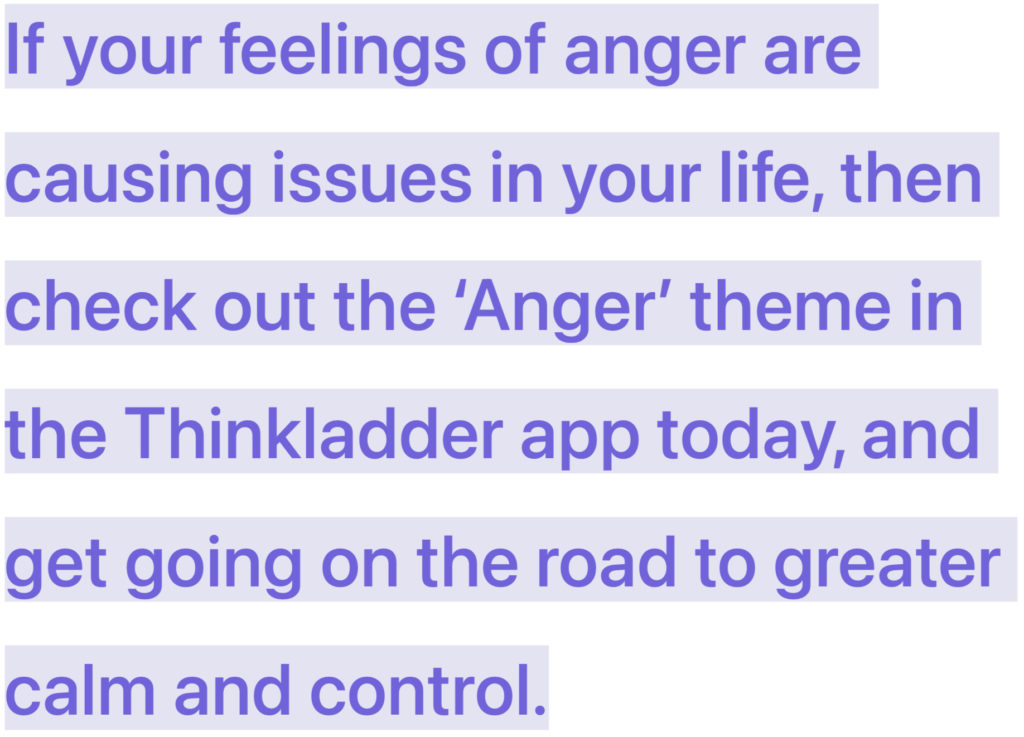Try out the Anger Theme on the Thinkladder app here:
Anger is a normal and healthy human emotion. It helps us deal with hurt, anxiety, and frustration, and lets us know that someone has crossed our values or boundaries. It can be a force for good in the world, spurring us to fight injustice and stand up for those who are unable to stand up for themselves. Anger can, however, also be an incredibly destructive force in our lives if it gets out of control – destroying relationships and opportunities.
Although can feel nearly impossible to manage anger, we can start the journey by reflecting on what underlying beliefs are feeding it. These could be something like, ‘Anger is the only appropriate response when I experience hurt,’ or, ‘Anger is the best way to protect myself.’ Once we identify these limiting beliefs, we can then go about challenging them with insights which envelop the hot coals of our anger with a refreshing mist.
If your feelings of anger are causing issues in your life, then check out the ‘Anger’ theme in the Thinkladder app today, and get going on the road to greater calm and control.
Insights from the Anger Theme
As I find a safe place to express my emotions, I may find that I am less likely to bottle them up and explode.
Practical tips to use in the moment:
Take a break: If you feel yourself getting angry, take a break from the situation.
Calm your nervous system: When you feel yourself getting angry, intervene with a mindfulness exercise. Practise to find one that you know will help calm your body and mind. Taking some deep, slow breaths can help slow down your heart rate and prevent you from reacting impulsively. Alternatively, go for a walk or listen to your favourite music. Mindfulness techniques can help you become more aware of your emotions and respond to them more effectively.
Communicate: Instead of lashing out or bottling up your emotions, try to express yourself in a calm, assertive, and constructive way. Almost all the time, there are other emotions lying beneath the surface of anger. Vulnerability can be a helpful tool to break the ice and encourage curiosity over hostility. When communicating with others, use “I” statements to express your feelings and needs without placing blame or attacking others.
Practice empathy: Try to see the situation from the other person’s point of view. This can help you understand their perspective and respond in a more compassionate and constructive way.
Problem-solve: If your anger is related to a specific problem or issue, engage in problem-solving to address the issue in a constructive way.
Break the ice: Humour can be an effective way to defuse a tense situation. Try to find the humour in the situation (tastefully) or use humour to lighten the mood.
Preparation and prevention:
Recognise your triggers: Pay attention to the situations, people, or events that tend to make you feel angry. Knowing your triggers can help you prepare and respond proactively.
Find an outlet for your emotions:. This could involve talking to a trusted person, writing in a journal, or engaging in a creative activity. Exercise can be an effective way to manage stress and reduce anger. Try to incorporate regular exercise into your routine.
Recognise the signs:. Learn to recognise the physical and emotional signs of anger: increased heart rate, tension in the body, and irritability. Being aware of your mind and body can help you intervene before your anger escalates.
Seek support:. If your anger is persistent or interferes with your daily life, consider seeking professional help from a therapist or counsellor. They can provide you with additional tools and support to manage your anger.
Dive deeper: Use Thinkladder to explore what limiting beliefs may potentially be fuelling your emotions. Our Anger theme contains hundreds of empowering insights to help you to break free from old patterns.
Related topics: People Pleasing, Self-Worth, Anxiety & Comparing Myself To Others.


